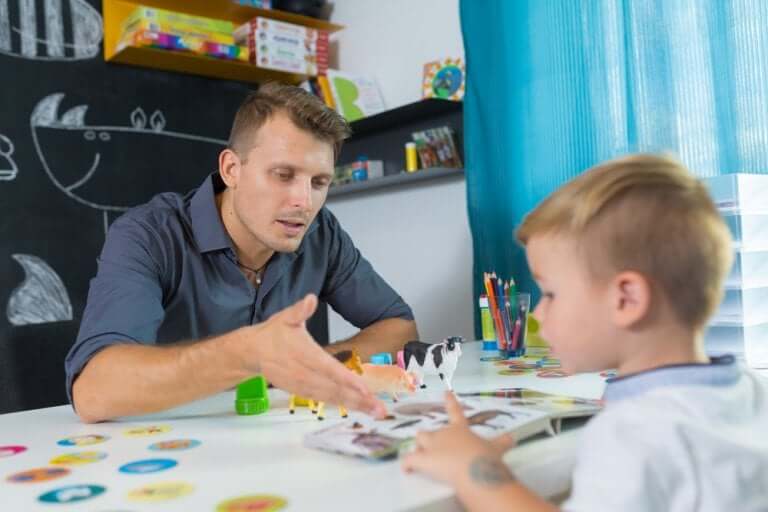What Is Educational Guidance?

Educational guidance refers to a systematic process. This process consists of a series of information, activities and methodologies aimed at students, families, and also anyone else involved in education.
What is educational guidance? Concept and objectives
We’re talking about a process that aims to help students carry out the development of their tasks in a school environment. This process is aimed at studying, discovering, and promoting a student’s different educational, personal, and social aspects and abilities. It also aims to help them get to know their possibilities, potential, and limitations.
In other words, it’ll provide them with the tools they need to get to know their cognitive abilities, preferences, likes, and inclinations. In addition, it aims to help them to become aware of the influence of these aspects on their current educational and social development. As well as this, it will shed light on their future professional and social development.
However, this process forms the basis of a preventive, general and systematic psycho-pedagogical procedure that’s the responsibility of an educational counselor.
Experts have designed, planned, and evaluated the procedure according to specific objectives. Counselors are the experts who will apply this procedure.

Different areas of guidance
- An educational, school or academic orientation. The aim here must be to take into account and adapt each person’s particular characteristics. All of this will be in accordance with his or her own teaching-learning process. To this end, the organizer will need to plan and organize specific activities. These will, as a result, help to develop skills related to self-learning and self-study.
- A vocational and professional orientation in charge of informing and advising on vocational aspects, interests, aptitudes and skills. In this sense, specific competencies must link to specific areas of opportunities in the field of work and professional development.
- A human or personal orientation. To assist with, and prevent, psychological, personal, and interpersonal processes and problems within the educational and family environment.
To achieve a personal guidance strategy action, you’ll need to work with conflict resolution and emotion management techniques. This can guarantee optimal professional and social development in the long term.
Principles and functions of educational guidance
To be able to explain in greater depth what educational guidance consists of, we need to point out some of the fundamental principles on which guidance is based. These principles appear in the publication Educational Guidance: Theoretical Foundations, Institutional Models and New Perspectives (2009).
- Prevention. This is all about preparing the person to avoid problems, and promoting healthy attitudes at a personal and interpersonal level and also in communication. The student receives guidance relating to the correct management of emotions and about adopting proactive attitudes.
- Development. This is the capacity of cognitive and intellectual development according to different fields of action. It refers to the processes of how people mature as a result of their experiential development.
- Social intervention. The context of the educational guidance must be a reference framework from which experts can analyze the recipient’s attitudes and behavior. The aim here is to avoid conflicts and negative situations.
- Personal strengthening. This should be a consequence of the guidance given. As a result of this, the person should be able to develop critical thinking and knowledge-building.
What does educational guidance consist of?
Educational guidance consists of developing specific functions, such as guiding, helping, training, accompanying, preventing, informing, advising, strengthening, motivating, planning, organizing, designing, programming, evaluating, and diagnosing.
However, the educational experts will develop this guidance. They’ll use problems related to teaching-learning processes, adaptation processes, labor insertion, interpersonal relations with colleagues of the educational center, or with families.
Likewise, these functions go hand in hand with the need for guidance to prevent unwanted behavior. These include drug and alcohol dependencies, unwanted pregnancies, gender violence, etc.
These are complex functions and those who take them on should be experts. They must be capable of working with a whole variety of circumstances, factors, and elements that they must deal with using their specific knowledge.

Those who possess this knowledge are educational guidance counselors with a degree in Pedagogy or Psychology. They’ll also work in educational centers’ counseling departments.
In turn, these experts also receive help from experts in areas such as psychopedagogy, therapeutic pedagogy, audition, and language, among others.
Conclusion
To conclude, we could say that educational guidance should involve and work with the joint collaboration of all education professionals, families, and the students themselves.
In short, an optimal educational guidance process seeks to ensure a comprehensive training for the students. The teachers should consider their diversity and attend to them in a personalized way that adapts to their specific needs.
Educational guidance refers to a systematic process. This process consists of a series of information, activities and methodologies aimed at students, families, and also anyone else involved in education.
What is educational guidance? Concept and objectives
We’re talking about a process that aims to help students carry out the development of their tasks in a school environment. This process is aimed at studying, discovering, and promoting a student’s different educational, personal, and social aspects and abilities. It also aims to help them get to know their possibilities, potential, and limitations.
In other words, it’ll provide them with the tools they need to get to know their cognitive abilities, preferences, likes, and inclinations. In addition, it aims to help them to become aware of the influence of these aspects on their current educational and social development. As well as this, it will shed light on their future professional and social development.
However, this process forms the basis of a preventive, general and systematic psycho-pedagogical procedure that’s the responsibility of an educational counselor.
Experts have designed, planned, and evaluated the procedure according to specific objectives. Counselors are the experts who will apply this procedure.

Different areas of guidance
- An educational, school or academic orientation. The aim here must be to take into account and adapt each person’s particular characteristics. All of this will be in accordance with his or her own teaching-learning process. To this end, the organizer will need to plan and organize specific activities. These will, as a result, help to develop skills related to self-learning and self-study.
- A vocational and professional orientation in charge of informing and advising on vocational aspects, interests, aptitudes and skills. In this sense, specific competencies must link to specific areas of opportunities in the field of work and professional development.
- A human or personal orientation. To assist with, and prevent, psychological, personal, and interpersonal processes and problems within the educational and family environment.
To achieve a personal guidance strategy action, you’ll need to work with conflict resolution and emotion management techniques. This can guarantee optimal professional and social development in the long term.
Principles and functions of educational guidance
To be able to explain in greater depth what educational guidance consists of, we need to point out some of the fundamental principles on which guidance is based. These principles appear in the publication Educational Guidance: Theoretical Foundations, Institutional Models and New Perspectives (2009).
- Prevention. This is all about preparing the person to avoid problems, and promoting healthy attitudes at a personal and interpersonal level and also in communication. The student receives guidance relating to the correct management of emotions and about adopting proactive attitudes.
- Development. This is the capacity of cognitive and intellectual development according to different fields of action. It refers to the processes of how people mature as a result of their experiential development.
- Social intervention. The context of the educational guidance must be a reference framework from which experts can analyze the recipient’s attitudes and behavior. The aim here is to avoid conflicts and negative situations.
- Personal strengthening. This should be a consequence of the guidance given. As a result of this, the person should be able to develop critical thinking and knowledge-building.
What does educational guidance consist of?
Educational guidance consists of developing specific functions, such as guiding, helping, training, accompanying, preventing, informing, advising, strengthening, motivating, planning, organizing, designing, programming, evaluating, and diagnosing.
However, the educational experts will develop this guidance. They’ll use problems related to teaching-learning processes, adaptation processes, labor insertion, interpersonal relations with colleagues of the educational center, or with families.
Likewise, these functions go hand in hand with the need for guidance to prevent unwanted behavior. These include drug and alcohol dependencies, unwanted pregnancies, gender violence, etc.
These are complex functions and those who take them on should be experts. They must be capable of working with a whole variety of circumstances, factors, and elements that they must deal with using their specific knowledge.

Those who possess this knowledge are educational guidance counselors with a degree in Pedagogy or Psychology. They’ll also work in educational centers’ counseling departments.
In turn, these experts also receive help from experts in areas such as psychopedagogy, therapeutic pedagogy, audition, and language, among others.
Conclusion
To conclude, we could say that educational guidance should involve and work with the joint collaboration of all education professionals, families, and the students themselves.
In short, an optimal educational guidance process seeks to ensure a comprehensive training for the students. The teachers should consider their diversity and attend to them in a personalized way that adapts to their specific needs.
All cited sources were thoroughly reviewed by our team to ensure their quality, reliability, currency, and validity. The bibliography of this article was considered reliable and of academic or scientific accuracy.
- Laguna Parras, A., Madrigal Martínez, A., Duarte Redondo, S., Vale Vasconcelos, P., Navarro Ascencio, E. (2009). Orientación educativa: fundamentos teóricos, modelos institucionales y nuevas perspectivas. CIDE.
- Orientación educativa. Redined. Ministerio de Educación, Cultura y Deporte. http://ntic.educacion.es/w3/recursos2/orientacion/
This text is provided for informational purposes only and does not replace consultation with a professional. If in doubt, consult your specialist.








